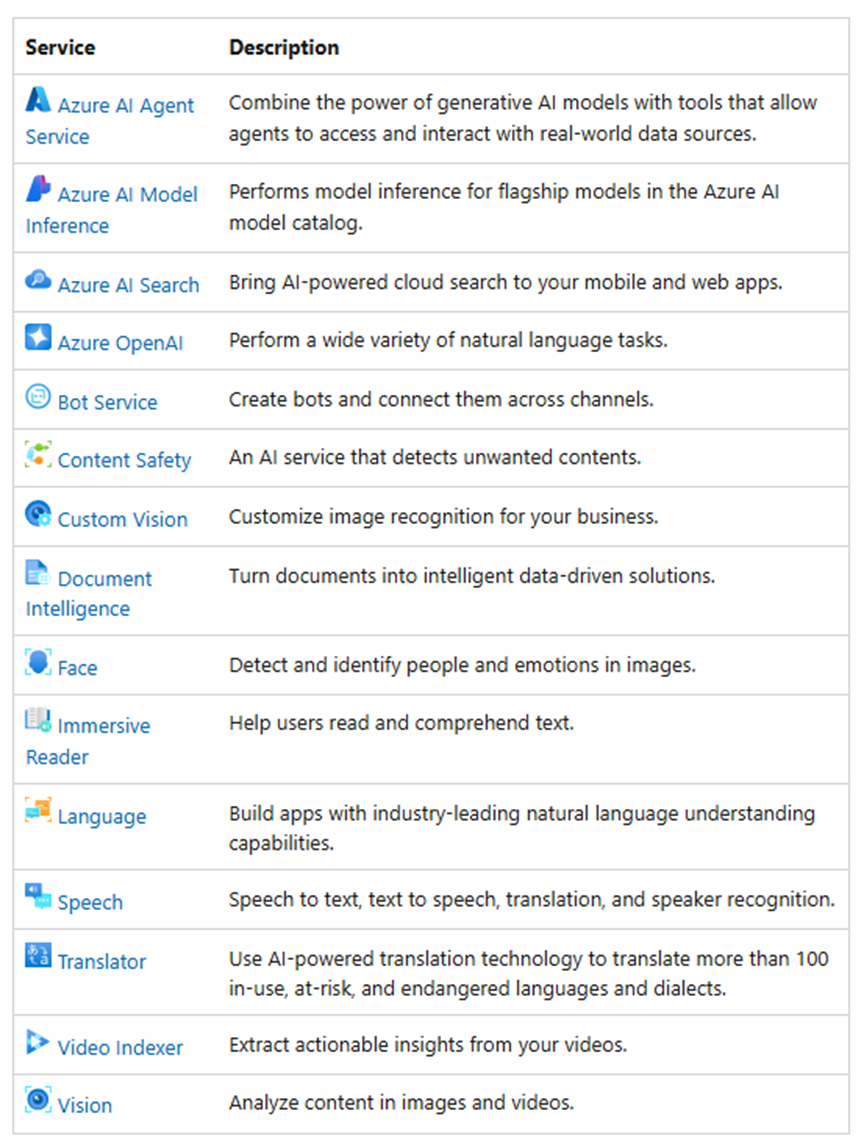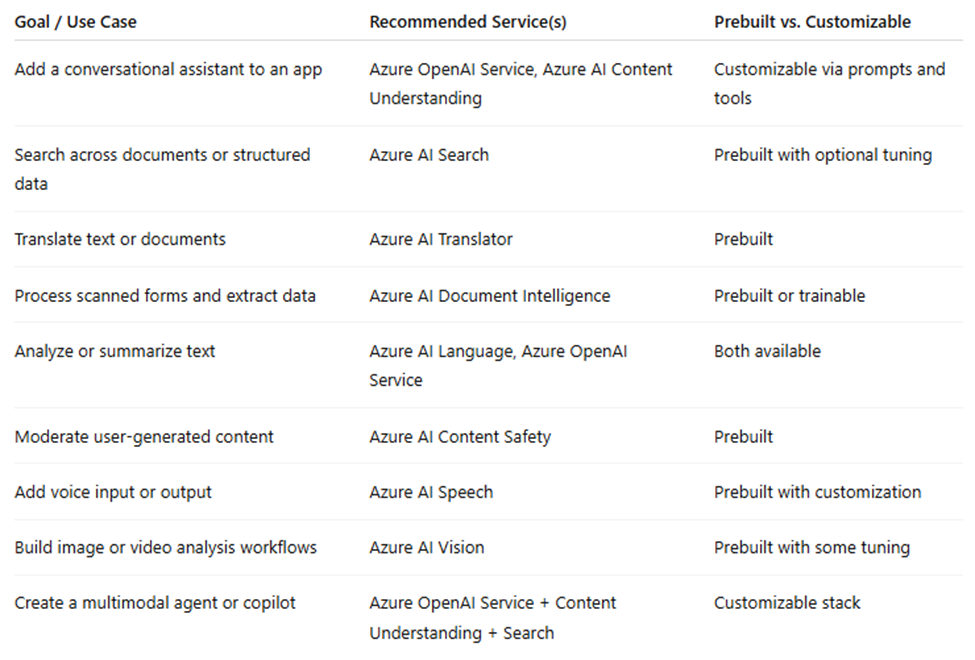

Azure AI Services is Microsoft’s portfolio of ready-to-use AI APIs and SDKs. It includes tools for vision, language, speech, translation, content moderation, and generative AI, all designed to work out of the box with minimal setup. These services run on Azure infrastructure and integrate with its identity, security, and compliance stack. All of the tools below are part of the Microsoft Azure AI Foundry offering, which provides enterprise-ready access to foundation models and cognitive capabilities across Azure.

Azure AI Services leverage advanced machine learning to enhance automation, accuracy, and customization in areas such as data processing, content analysis, and user interaction. These production-ready APIs and SDKs are designed for engineering teams and developers who want to add AI capabilities like vision, speech, translation, and content moderation without managing model training or orchestration.
Built on Microsoft’s secure Azure platform, Azure AI Services offer modular components that can be easily integrated into new or existing systems. Whether you're developing document workflows, enterprise search experiences, or intelligent assistants, these services are optimized for scalability, governance, and real-time performance.
Client libraries and REST APIs are available in popular development languages, simplifying integration, customization, and ongoing management of AI models and functionalities.
This article gives you a practical overview of the current Azure AI Services lineup. It covers each tool’s functionality, pricing model, and usage scenarios, along with guidance on when to use which service based on your goals and architecture needs. For accurate cost planning, we recommend using the Azure Pricing Calculator.
Provides API access to OpenAI’s latest models, including GPT-5, GPT-4.1, GPT-4o, o-models, SORA and Codex variants. Models support long context windows, multimodal input (text, image, audio), and advanced reasoning capabilities.
Use cases: Copilots, generative assistants, content summarization, knowledge retrieval, code generation
Pricing: Per million tokens (input and output), rates vary by model and deployment type. Microsoft is offering the following pricing and cost management solutions: standard (pay-as-you-go), provisioned (allocated with predictable costs), batch API (returns completions within 24 hours for a 50% discount on Global Standard Pricing).
Detailed article: https://www.itmagination.com/technologies/azure-openai-service
An enterprise search engine with semantic ranking, hybrid retrieval (text and vector), and full integration with LLMs. Supports filters, scoring profiles, and custom indexers. Azure AI Search can also extract text from images and documents using OCR technology, enabling processing of unstructured data for more relevant search results. It supports integration with SQL Server for data ingestion and with Power BI for visualizing search and anomaly detection results.
Use cases: Enterprise knowledge search, app search, chatbot grounding with retrieval-augmented generation (RAG).
Pricing: Based on search units, indexing operations, and storage.
Detailed article: www.itmagination.com/technologies/azure-ai-search
Detects offensive, harmful, or sensitive content in text and images. Flags content across categories like hate, sexual content, violence, and self-harm. Azure AI Content Safety can also detect inappropriate content, unwanted content, and AI-generated content across various media formats.
Use cases: Moderation for chatbots, forums, community platforms, and AI agents.
Pricing: Charged per number of text records or images.
Detailed article: https://www.itmagination.com/technologies/azure-ai-content-safety
Extracts structured data from unstructured documents using prebuilt or custom models. Supports OCR, key-value pairing, tables, and handwriting. Azure AI Document Intelligence can also analyze images within documents to extract relevant information, enabling intelligent document processing.
Use cases: Invoice processing, contract review, digital mailrooms.
Pricing: Based on number of pages processed, tiered by model type (custom, prebuilt, read).
Detailed article: https://www.itmagination.com/technologies/azure-ai-document-intelligence
Includes speech-to-text, text-to-speech, translation, and speaker identification. Offers batch and real-time modes with customizable voice models.
Azure AI Speech enhances customer experiences by enabling more natural and accessible interactions in applications, improving communication and engagement.
Use cases: Call center automation, accessibility features, multilingual voice interfaces.
Pricing: Per minute (speech-to-text), per character (text-to-speech), per second (speech translation), or per transaction (speaker recognition) model and region dependent.
Detailed article: https://www.itmagination.com/technologies/azure-ai-speech
Natural language processing APIs for tasks like sentiment analysis, summarization, classification, and question answering. Multilingual and domain-adaptable. Azure AI Language provides advanced language understanding capabilities for integrating, training, and deploying natural language processing models.
Use cases: Feedback analysis, document tagging, knowledge mining.
Pricing: In tiers: free, standard. Pricing is determined per text records or characters, depending on features used.
Detailed article: https://www.itmagination.com/technologies/azure-ai-language
Real-time machine translation for over 100 languages. Also supports transliteration and document translation with layout preservation. Azure AI Translator can automatically detect the source language of documents and translate them into the desired target language while preserving the original formatting.
Use cases: Multilingual apps, document localization, chatbot language coverage.
Pricing: Multiple tiers of pricing, all of them priced per million characters.
Detailed article: https://www.itmagination.com/technologies/azure-ai-translator
Analyzes images and video for text, objects, people, and scenes. Supports OCR, spatial analysis, facial detection, and tagging.
Use cases: Retail footfall analysis, identity verification, image-based document intake.
Pricing: Azure AI Vision uses a transaction-based pricing model. Costs vary depending on the feature group (e.g., image tagging, dense captions, custom models), usage tier (volume-based), and deployment type (cloud, edge, or container). Spatial analysis and video processing are priced separately by duration or query volume. A free tier is available for limited monthly usage.
Detailed article: https://www.itmagination.com/technologies/azure-ai-vision
Combines language, vision, and speech capabilities to build multimodal applications. Foundation for intelligent copilots, smart agents, and embedded assistants.
Use cases: Context-aware copilots, semantic search, AI-driven document exploration
Pricing: Built on top of other services; cost depends on combined usage (detailed in individual tool breakdowns)
Detailed article: www.itmagination.com/technologies/azure-ai-content-understanding
Azure AI Services are built on Azure’s enterprise-grade security and governance foundation. They inherit Azure’s identity, networking, and compliance infrastructure, while aligning with Microsoft’s broader Microsoft Cloud for Financial Services compliance program, making them well-suited for regulated environments.
The right service depends on how specific your use case is, how much control you need, and the tradeoffs you’re willing to make between performance, flexibility, and cost. Costs and pricing models for Azure AI Services vary based on factors such as service type, usage volume, and deployment region. Below is a simplified decision matrix to help map requirements to the appropriate services.

Each Azure AI Service in this overview will have a dedicated article with deeper technical guidance, pricing breakdowns, limitations, and implementation tips. These links will be added as they’re published:
Contact us if you’re exploring architecture options, proof-of-concept work, or scaling AI workloads across your enterprise. We support both native Azure AI deployments and hybrid setups using Azure Machine Learning, so you can run models closer to your data, whether that’s in Azure, on-prem, or across multiple regions.
